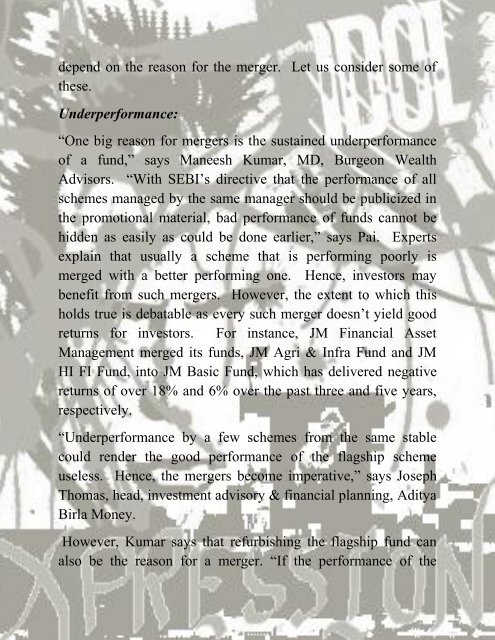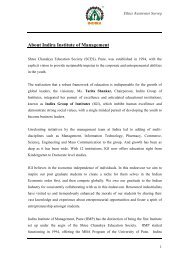Xpressions - XI - Indira Institutes
Xpressions - XI - Indira Institutes
Xpressions - XI - Indira Institutes
You also want an ePaper? Increase the reach of your titles
YUMPU automatically turns print PDFs into web optimized ePapers that Google loves.
depend on the reason for the merger. Let us consider some of<br />
these.<br />
Underperformance:<br />
“One big reason for mergers is the sustained underperformance<br />
of a fund,” says Maneesh Kumar, MD, Burgeon Wealth<br />
Advisors. “With SEBI’s directive that the performance of all<br />
schemes managed by the same manager should be publicized in<br />
the promotional material, bad performance of funds cannot be<br />
hidden as easily as could be done earlier,” says Pai. Experts<br />
explain that usually a scheme that is performing poorly is<br />
merged with a better performing one. Hence, investors may<br />
benefit from such mergers. However, the extent to which this<br />
holds true is debatable as every such merger doesn’t yield good<br />
returns for investors. For instance, JM Financial Asset<br />
Management merged its funds, JM Agri & Infra Fund and JM<br />
HI FI Fund, into JM Basic Fund, which has delivered negative<br />
returns of over 18% and 6% over the past three and five years,<br />
respectively.<br />
“Underperformance by a few schemes from the same stable<br />
could render the good performance of the flagship scheme<br />
useless. Hence, the mergers become imperative,” says Joseph<br />
Thomas, head, investment advisory & financial planning, Aditya<br />
Birla Money.<br />
However, Kumar says that refurbishing the flagship fund can<br />
also be the reason for a merger. “If the performance of the








